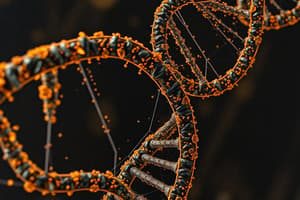Podcast
Questions and Answers
What happens to a biological sample if it is not properly collected, packaged, and preserved?
What happens to a biological sample if it is not properly collected, packaged, and preserved?
- It will begin to degrade. (correct)
- It remains unchanged indefinitely.
- It increases in size and volume.
- It becomes more valuable as evidence.
What is the first step performed by a Forensic Biology examiner on evidence?
What is the first step performed by a Forensic Biology examiner on evidence?
- Contacting the crime scene investigator.
- Identifying possible biological substances. (correct)
- Packaging the evidence for storage.
- Analyzing the DNA structure.
What can happen if proper precautions are not taken during the collection of evidentiary samples?
What can happen if proper precautions are not taken during the collection of evidentiary samples?
- All biological substances will vanish.
- The samples will become more visible.
- There is a risk of destroying the evidence.
- Contamination can occur from foreign DNA. (correct)
How many different genetic areas of the DNA are tested using the designed DNA technology?
How many different genetic areas of the DNA are tested using the designed DNA technology?
What is the purpose of comparing the DNA profile from evidence to known samples?
What is the purpose of comparing the DNA profile from evidence to known samples?
What type of biological substances might be found at a crime scene?
What type of biological substances might be found at a crime scene?
What can result from improper packaging or handling of evidence?
What can result from improper packaging or handling of evidence?
Who should be contacted for questions regarding evidence handling procedures?
Who should be contacted for questions regarding evidence handling procedures?
What is the primary purpose of mitochondrial DNA testing?
What is the primary purpose of mitochondrial DNA testing?
In what scenario is Y-chromosome DNA testing particularly useful?
In what scenario is Y-chromosome DNA testing particularly useful?
What happens if the DNA profile obtained from the evidence does not match known samples?
What happens if the DNA profile obtained from the evidence does not match known samples?
Which of the following is true about Y-chromosome DNA profiles?
Which of the following is true about Y-chromosome DNA profiles?
What is a limitation of mitochondrial DNA testing?
What is a limitation of mitochondrial DNA testing?
When is the Forensic Biology Section likely to perform DNA analyses for criminal paternity or maternity?
When is the Forensic Biology Section likely to perform DNA analyses for criminal paternity or maternity?
Which type of DNA profile is least suitable for searching against the Virginia DNA Data Bank?
Which type of DNA profile is least suitable for searching against the Virginia DNA Data Bank?
What is a key difference between mitochondrial DNA and Y-chromosome DNA testing?
What is a key difference between mitochondrial DNA and Y-chromosome DNA testing?
What should the RFLE form list for two blood stained swabs collected from a breaking and entering?
What should the RFLE form list for two blood stained swabs collected from a breaking and entering?
If the investigator submits a convenience bag containing a VPERK and clothing, how should the RFLE form list the clothing?
If the investigator submits a convenience bag containing a VPERK and clothing, how should the RFLE form list the clothing?
What item is listed on the RFLE form when a VPERK box is received with clothing inside?
What item is listed on the RFLE form when a VPERK box is received with clothing inside?
Which of the following items would NOT be listed on the RFLE form for the convenience bag scenario?
Which of the following items would NOT be listed on the RFLE form for the convenience bag scenario?
In the scenario of submitting blood stained swabs, how were the stains collected?
In the scenario of submitting blood stained swabs, how were the stains collected?
What is mitochondrial DNA testing primarily used for?
What is mitochondrial DNA testing primarily used for?
Which statement is true about Y-Chromosome DNA?
Which statement is true about Y-Chromosome DNA?
What do Physical Evidence Recovery Kits (PERK) primarily aid in recovering?
What do Physical Evidence Recovery Kits (PERK) primarily aid in recovering?
What does 'trace DNA evidence' refer to?
What does 'trace DNA evidence' refer to?
What is the primary purpose of the Virginia DNA Data Bank?
What is the primary purpose of the Virginia DNA Data Bank?
What type of biological substances does semen consist of?
What type of biological substances does semen consist of?
What is 'wearer DNA'?
What is 'wearer DNA'?
The Virginia DNA Data Bank is connected to which larger database?
The Virginia DNA Data Bank is connected to which larger database?
What should be done with the underpants worn by the victim during and/or immediately after the assault?
What should be done with the underpants worn by the victim during and/or immediately after the assault?
What is the best method for submitting swabs containing wet evidence such as blood or seminal fluid?
What is the best method for submitting swabs containing wet evidence such as blood or seminal fluid?
What can be collected from the sexual assault scene if the assault occurred on a bed?
What can be collected from the sexual assault scene if the assault occurred on a bed?
If no underpants were worn by the victim immediately after the assault, what should be submitted instead?
If no underpants were worn by the victim immediately after the assault, what should be submitted instead?
Why is it important to submit evidence to the laboratory within a week?
Why is it important to submit evidence to the laboratory within a week?
What should be done if the collected evidence has not been air-dried?
What should be done if the collected evidence has not been air-dried?
What types of items may need to be collected from the assault scene?
What types of items may need to be collected from the assault scene?
What is important to ask regarding the underpants worn by the victim?
What is important to ask regarding the underpants worn by the victim?
Flashcards are hidden until you start studying
Study Notes
Forensic Biology Overview
- Biological evidence degrades if not collected, packaged and preserved properly
- Sensitive DNA technology used in forensic testing requires proper precautions to avoid contamination
- Proper evidence handling and packaging prevent cross contamination
- Forensic Biology examiners screen biological substances (e.g. blood, semen, saliva) in evidence
- DNA testing analyzes biological material at 24 distinct genetic areas
- DNA profiles from evidence are compared to know profiles (victim, suspect, elimination samples)
- Mitochondrial DNA testing used for samples where nuclear DNA testing fails (e.g. hairs without roots, bone, teeth)
- Y-chromosome DNA is male specific and is found in the nucleus of most cells, inherited paternally
- Males in the same family have the same Y-chromosome DNA profile, except for mutations
- Physical Evidence Recovery Kits (PERK) are used for recovering physical evidence from sexual assault & homicide victims and suspects
- PERK Kits are designed to help collect foreign secretions and trace evidence such as hairs and fibers
- Semen is a biological substance secreted by males, containing seminal fluid and spermatozoa
- Seminal fluid is a biologic fluid produced by males where spermatozoa reside (if present)
- Trace DNA evidence is found on surfaces and materials through casual contact (e.g. keys, gun grips, knife handles)
- The Virginia DNA Data Bank stores DNA profiles of convicted offenders and individuals arrested for certain felonies
- A buccal (cheek) sample is collected from each person and a DNA profile is developed
- DNA profiles in the Data Bank are stored for comparison purposes
- The Virginia DNA Data Bank also contains DNA profiles from evidence (solved and unsolved cases) to connect unrelated cases to a perpetrator
- This Database is linked to the National DNA Data Bank, which contains profiles from labs across the country
- Eligible profiles in the Virginia DNA Data Bank are automatically sent to the National DNA Data Bank on completion of the case
- Wearer DNA is DNA from articles of clothing believed to have been deposited by individuals wearing the clothing
- If the DNA profile from evidence is consistent with a known sample, statistical calculations determine the probability the individual cannot be excluded as a contributor
Mitochondrial DNA Testing
- Used in Missing Persons/Body Identification cases to improve the reliability of identifications
- Used in serious felony investigations when other DNA testing methods yield limited to no results
- Determines the linear order of the building blocks in the DNA molecule, resulting in a "mitotype" which is compared against reference samples.
Y-Chromosome DNA Testing
- Used in cases involving mixtures with a high female to male DNA ratio
- Used in lineage testing such as body identification, paternity, and missing persons cases when traditional nuclear DNA testing provides no results
- Only the Y-chromosome DNA profile is developed
- Y-Chromosome testing does not produce searchable DNA profiles and therefore cannot be used in cases without known reference samples.
Virginia DNA Data Bank (Additional Information)
- If the DNA profile from evidence cannot be matched to a suspect or victim or other known individuals, the profile is searched against the Virginia DNA Data Bank and National DNA Data Bank.
- Profiles that are unsuitable for searching include mixture profiles (more than one person) and partial DNA profiles
Criminal Paternity/Maternity
- Forensic Biology Section performs DNA analysis in cases involving incest or rape that resulted in the birth of a child
- Known blood or buccal samples from the victim, suspect, and child are submitted for comparison
- Other items such as clothing collected with the PERK may be submitted based on the case scenario
Evidence Item Considerations:
- Sexual Assault Victim's Underpants: Submit underpants worn during or immediately after the assault if not included in the PERK. Underpants that were worn to the hospital, but not during the assault, may need to be retrieved and submitted. Package in paper to facilitate drying. Ask if the underpants worn by the victim to the hospital are the same ones worn immediately after the assault. Other clothing items (e.g., blue jeans or shorts) that were in contact with the genital area may be submitted.
- Physical Evidence from Sexual Assault Scene: Collect the top surface of bed linen, actual seat fabric cuttings and/or swabs of stains if the assault occurred in a vehicle, towels or tissues used by the suspect and/or victim, package in paper to promote drying. Collect swabs containing wet blood, seminal fluid, saliva, or distilled water used to moisten the swab for dried stain collection. Ensure swabs are air-dried or put in a labeled swab box to dry and submitted to the laboratory as soon as possible or refrigerated until submitted (within one week to reduce degradation).
- Swabs: Indicate if the swabs have not been air-dried on the RFLE form.
Studying That Suits You
Use AI to generate personalized quizzes and flashcards to suit your learning preferences.




